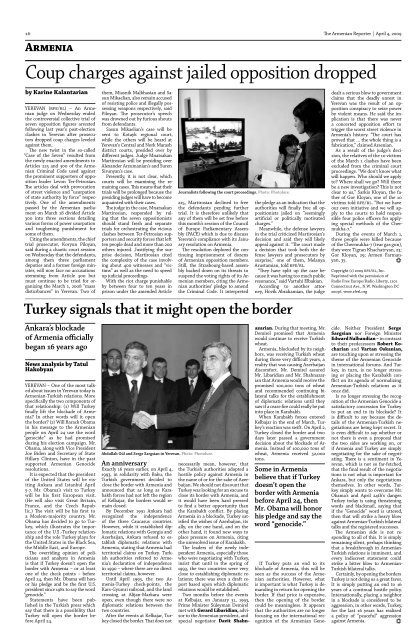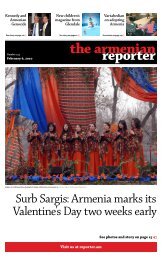National, International, Armenia, and Community News and Opinion
National, International, Armenia, and Community News and Opinion
National, International, Armenia, and Community News and Opinion
You also want an ePaper? Increase the reach of your titles
YUMPU automatically turns print PDFs into web optimized ePapers that Google loves.
16 The <strong>Armenia</strong>n Reporter | April 4, 2009<br />
<strong>Armenia</strong><br />
Coup charges against jailed opposition dropped<br />
by Karine Kalantarian<br />
YEREVAN (RFE/RL) – An <strong>Armenia</strong>n<br />
judge on Wednesday ended<br />
the controversial collective trial of<br />
seven opposition figures arrested<br />
following last year’s post-election<br />
clashes in Yerevan after prosecutors<br />
dropped coup charges leveled<br />
against them.<br />
The new twist in the so-called<br />
“Case of the Seven” resulted from<br />
the newly enacted amendments to<br />
Articles 225 <strong>and</strong> 300 of the <strong>Armenia</strong>n<br />
Criminal Code used against<br />
the prominent supporters of opposition<br />
leader Levon Ter-Petrosian.<br />
The articles deal with provocation<br />
of street violence <strong>and</strong> “usurpation<br />
of state authority by force” respectively.<br />
One of the amendments<br />
passed by the <strong>Armenia</strong>n parliament<br />
on March 18 divided Article<br />
300 into three sections detailing<br />
various forms of power usurpation<br />
<strong>and</strong> toughening punishment for<br />
some of them.<br />
Citing the amendments, the chief<br />
trial prosecutor, Koryun Piloyan,<br />
said during a chaotic court session<br />
on Wednesday that the defendants,<br />
among them three parliament<br />
deputies <strong>and</strong> a former foreign minister,<br />
will now face no accusations<br />
stemming from Article 300 but<br />
must continue to be tried for organizing<br />
the March 1, 2008 “mass<br />
disturbances” in Yerevan. Two of<br />
them, Miasnik Malkhasian <strong>and</strong> Sasun<br />
Mikaelian, also remain accused<br />
of resisting police <strong>and</strong> illegally possessing<br />
weapons respectively, said<br />
Piloyan. The prosecutor’s speech<br />
was drowned out by furious shouts<br />
from defendants.<br />
Sasun Mikaelian’s case will be<br />
sent to Kotayk regional court,<br />
while the others will be heard at<br />
Yerevan’s Central <strong>and</strong> Nork Marash<br />
district courts, presided over by<br />
different judges. Judge Mnatsakan<br />
Martirosian will be presiding over<br />
Alex<strong>and</strong>er Arzumanian’s <strong>and</strong> Suren<br />
Sirunyan’s case.<br />
Presently, it is not clear, which<br />
courts will be examining the remaining<br />
cases. This means that their<br />
trials will be prolonged because the<br />
presiding judges will have to become<br />
acquainted with their cases.<br />
The judge in the case, Mnatsakan<br />
Martirosian, responded by ruling<br />
that the seven oppositionists<br />
should st<strong>and</strong> fresh <strong>and</strong> separate<br />
trials for orchestrating the vicious<br />
clashes between Ter-Petrosian supporters<br />
<strong>and</strong> security forces that left<br />
ten people dead <strong>and</strong> more than 200<br />
others injured. Justifying the surprise<br />
decision, Martirosian cited<br />
the complexity of the case involving<br />
about 400 witnesses <strong>and</strong> “victims”<br />
as well as the need to speed<br />
up judicial proceedings.<br />
With the riot charge punishable<br />
by between four to ten years in<br />
prison under the amended Article<br />
225, Martirosian declined to free<br />
the defendants pending further<br />
trial. It is therefore unlikely that<br />
any of them will be set free before<br />
this month’s session of the Council<br />
of Europe Parliamentary Assembly<br />
(PACE) which is due to discuss<br />
Yerevan’s compliance with its January<br />
resolution on <strong>Armenia</strong>.<br />
The resolution deplored the continuing<br />
imprisonment of dozens<br />
of <strong>Armenia</strong>n opposition members.<br />
Still, the Strasbourg-based assembly<br />
backed down on its threats to<br />
suspend the voting rights of its <strong>Armenia</strong>n<br />
members, citing the <strong>Armenia</strong>n<br />
authorities’ pledge to amend<br />
the Criminal Code. It interpreted<br />
the pledge as an indication that the<br />
authorities will finally free all oppositionists<br />
jailed on “seemingly<br />
artificial or politically motivated<br />
charges.”<br />
Meanwhile, the defense lawyers<br />
in the trial criticized Martirosian’s<br />
decision <strong>and</strong> said they will likely<br />
appeal against it. “The court made<br />
a decision that took both the defense<br />
lawyers <strong>and</strong> prosecutors by<br />
surprise,” one of them, Melanya<br />
Arustamian, told RFE/RL.<br />
“They have split up the case because<br />
it was having too much public<br />
resonance,” said Vartuhi Elbakian.<br />
According to another attorney,<br />
Hovik Abrahamian, the judge<br />
Turkey signals that it might open the border<br />
Ankara’s blockade<br />
of <strong>Armenia</strong> officially<br />
began 16 years ago<br />
<strong>News</strong> analysis by Tatul<br />
Hakobyan<br />
YEREVAN – One of the most talked<br />
about issues in Yerevan today is<br />
<strong>Armenia</strong>n-Turkish relations. More<br />
specifically the two components of<br />
that relationship: (1) Will Turkey<br />
finally lift the blockade of <strong>Armenia</strong><br />
In other words will it open<br />
the border (2) Will Barack Obama<br />
in his message to the <strong>Armenia</strong>n<br />
people on April 24 use the word<br />
“genocide” as he had promised<br />
during his election campaign. Mr.<br />
Obama, along with Vice President<br />
Joe Biden <strong>and</strong> Secretary of State<br />
Hillary Clinton, have in the past<br />
supported <strong>Armenia</strong>n Genocide<br />
resolutions.<br />
It is expected that the president<br />
of the United States will be visiting<br />
Ankara <strong>and</strong> Istanbul April<br />
5-7. Mr. Obama’s visit to Turkey<br />
will be his first European visit.<br />
(He will also visit Great Britain,<br />
France, <strong>and</strong> the Czech Republic.)<br />
The visit will be his first to<br />
a Moslem-majority country. Mr.<br />
Obama has decided to go to Turkey,<br />
which illustrates the importance<br />
of the U.S.-Turkey relationship<br />
<strong>and</strong> the role Turkey plays for<br />
the United States in the Black Sea,<br />
the Middle East, <strong>and</strong> Europe.<br />
The overriding opinion of politicians<br />
<strong>and</strong> analysts in <strong>Armenia</strong><br />
is that if Turkey doesn’t open the<br />
border with <strong>Armenia</strong> – or at least<br />
one of the check points – before<br />
April 24, then Mr. Obama will honor<br />
his pledge <strong>and</strong> be the first U.S.<br />
president since 1981 to say the word<br />
“genocide.”<br />
Statements have been published<br />
in the Turkish press which<br />
say that there is a possibility that<br />
Turkey will open the border before<br />
April 24.<br />
Abdullah Gül <strong>and</strong> Serge Sargsian in Yerevan. Photo: Photolure.<br />
An anniversary<br />
Exactly 16 years earlier, on April 4,<br />
1993, in solidarity with Baku, the<br />
Turkish government decided to<br />
close the border with <strong>Armenia</strong> <strong>and</strong><br />
announced that as long as Karabakh<br />
forces had not left the region<br />
of Kelbajar, the borders would remain<br />
closed.<br />
By December 1991 Ankara had<br />
recognized the independence<br />
of the three Caucasus countries.<br />
However, while it established diplomatic<br />
relations with Georgia <strong>and</strong><br />
Azerbaijan, Ankara refused to establish<br />
diplomatic relations with<br />
<strong>Armenia</strong>, stating that <strong>Armenia</strong> had<br />
territorial claims on Turkey. Turkish<br />
authorities referred to <strong>Armenia</strong>’s<br />
declaration of independence<br />
in 1990 – where there are no direct<br />
territorial claims, however.<br />
Until April 1993, the two <strong>Armenia</strong>-Turkey<br />
check-points, the<br />
Kars-Gyumri railroad, <strong>and</strong> the l<strong>and</strong><br />
crossing at Alijan-Markara were<br />
open, even though there were no<br />
diplomatic relations between the<br />
two countries.<br />
After the events at Kelbajar, Turkey<br />
closed the border. That does not<br />
Journalists following the court proceedings. Photo: Photolure.<br />
necessarily mean, however, that<br />
the Turkish authorities adopted a<br />
hostile policy against <strong>Armenia</strong> in<br />
the name of or for the sake of Azerbaijan.<br />
We should not discount that<br />
Turkey was looking for an excuse to<br />
close its border with <strong>Armenia</strong>, <strong>and</strong><br />
it would have been hard pressed<br />
to find a better opportunity than<br />
the Karabakh conflict. By placing<br />
<strong>Armenia</strong> in a blockade, Turkey satisfied<br />
the wishes of Azerbaijan, its<br />
ally, on the one h<strong>and</strong>, <strong>and</strong> on the<br />
other h<strong>and</strong>, it found new ways to<br />
place pressure on <strong>Armenia</strong>, citing<br />
the unresolved issue of Karabakh.<br />
The leaders of the newly independent<br />
<strong>Armenia</strong>, especially those<br />
who were negotiating with Turkey,<br />
insist that until in the spring of<br />
1993, the two countries were very<br />
close to establishing diplomatic relations;<br />
there was even a draft report<br />
based upon which diplomatic<br />
relations would be established.<br />
Two months before the events<br />
at Kelbajar, on January 31, 1993,<br />
Prime Minister Süleyman Demirel<br />
met with Gerard Libaridian, advisor<br />
to the <strong>Armenia</strong>n president, <strong>and</strong><br />
special negotiator Davit Shahnazarian.<br />
During that meeting, Mr.<br />
Demirel promised that <strong>Armenia</strong><br />
would continue to receive Turkish<br />
wheat.<br />
<strong>Armenia</strong>, blockaded by its neighbors,<br />
was receiving Turkish wheat<br />
during those very difficult years, a<br />
reality that was causing Azerbaijan<br />
discomfort. Mr. Demirel assured<br />
Mr. Libaridian <strong>and</strong> Mr. Shahnazarian<br />
that <strong>Armenia</strong> would receive the<br />
promised 100,000 tons of wheat<br />
<strong>and</strong> recommended continuing bilateral<br />
talks for the establishment<br />
of diplomatic relations until they<br />
saw if a cease fire could really be put<br />
into place in Karabakh.<br />
When Karabakh forces entered<br />
Kelbajar in the end of March, Turkey’s<br />
reaction was swift. On April 2,<br />
Turkey closed the border <strong>and</strong> two<br />
days later passed a government<br />
decision about the blockade of <strong>Armenia</strong>.<br />
Instead of 100,000 tons of<br />
wheat, <strong>Armenia</strong> received 52,000<br />
tons.<br />
Some in <strong>Armenia</strong><br />
believe that if Turkey<br />
doesn’t open the<br />
border with <strong>Armenia</strong><br />
before April 24, then<br />
Mr. Obama will honor<br />
his pledge <strong>and</strong> say the<br />
word “genocide.”<br />
dealt a serious blow to government<br />
claims that the deadly unrest in<br />
Yerevan was the result of an opposition<br />
conspiracy to seize power<br />
by violent means. He said the implication<br />
is that there was never<br />
a concerted opposition effort to<br />
trigger the worst street violence in<br />
<strong>Armenia</strong>’s history. “The court has<br />
proved that … the whole thing is a<br />
fabrication,” claimed Arsenian.<br />
As a result of the judge’s decision,<br />
the relatives of the 10 victims<br />
of the March 1 clashes have been<br />
excluded from the criminal court<br />
proceedings. “We don’t know what<br />
will happen. Who should we apply<br />
to Where shall we go Will there<br />
be a new investigation This is not<br />
clear to us,” Sarkis Kloyan, the father<br />
of Gor Kloyan, one of the 10<br />
victims told RFE/RL. “But we have<br />
our own initiative <strong>and</strong> we will apply<br />
to the courts to hold responsible<br />
four police officers for applying<br />
special methods of the Chermukha-7.”<br />
During the events of March 1,<br />
three people were killed because<br />
of the Chermukha-7 (tear gas gun),<br />
they were Tigran Khachatryan, 23;<br />
Gor Kloyan, 29; Armen Farmanyan,<br />
35.<br />
f<br />
Copyright (c) 2009 RFE/RL, Inc.<br />
Reprinted with the permission of<br />
Radio Free Europe/Radio Liberty, 1201<br />
Connecticut Ave., N.W. Washington DC<br />
20036. www.rferl.org<br />
If Turkey puts an end to its<br />
blockade of <strong>Armenia</strong>, this will be<br />
seen as the success of the <strong>Armenia</strong>n<br />
authorities. However, what<br />
is important is what Turkey is dem<strong>and</strong>ing<br />
in return for opening the<br />
border. If that price is expensive,<br />
then the opening of the border<br />
could be meaningless. It appears<br />
that the authorities are no longer<br />
focusing on the international recognition<br />
of the <strong>Armenia</strong>n Genocide.<br />
Neither President Serge<br />
Sargsian nor Foreign Minister<br />
Edward Nalb<strong>and</strong>ian – in contrast<br />
to their predecessors Robert Kocharian<br />
<strong>and</strong> Vartan Oskanian,<br />
are touching upon or stressing the<br />
theme of the <strong>Armenia</strong>n Genocide<br />
in international forums. And Turkey,<br />
in turn, is no longer stressing<br />
or placing the Karabakh conflict<br />
on its agenda of normalizing<br />
<strong>Armenia</strong>n-Turkish relations as it<br />
once did.<br />
Is no longer stressing the recognition<br />
of the <strong>Armenia</strong>n Genocide a<br />
satisfactory concession for Turkey<br />
to put an end to its blockade It<br />
is difficult to say because the details<br />
of the <strong>Armenia</strong>n-Turkish negotiations<br />
are being kept secret. It<br />
is even difficult to say whether or<br />
not there is even a proposal that<br />
the two sides are working on, or<br />
if <strong>Armenia</strong> <strong>and</strong> Turkey are simply<br />
negotiating for the sake of negotiating.<br />
There is a sentiment in Yerevan,<br />
which is not so far-fetched,<br />
that the final result of the negotiations<br />
is not what is important for<br />
Ankara, but only the negotiations<br />
themselves. In other words, Turkey<br />
simply wants to overcome Mr.<br />
Obama’s <strong>and</strong> April 24th’s danger.<br />
Turkey today is using threatening<br />
words <strong>and</strong> blackmail, saying that<br />
if the “Genocide” word is uttered,<br />
then that will strike a heavy blow<br />
against <strong>Armenia</strong>n-Turkish bilateral<br />
talks <strong>and</strong> the registered successes.<br />
The <strong>Armenia</strong>n side is not responding<br />
to all of this. It is simply<br />
remaining silent, perhaps thinking<br />
that a breakthrough in <strong>Armenia</strong>n-<br />
Turkish relations is imminent, <strong>and</strong><br />
every indiscreet statement could<br />
strike a bitter blow to <strong>Armenia</strong>n-<br />
Turkish bilateral talks.<br />
Certainly, by opening the borders<br />
Turkey is not doing us a great favor.<br />
It is simply putting an end to 16<br />
years of a continual hostile policy.<br />
<strong>International</strong>ly, placing a neighbor<br />
in a blockade is considered to be<br />
aggression, in other words, Turkey,<br />
for the last 16 years has realized<br />
a policy of “peaceful” aggression<br />
against <strong>Armenia</strong>.<br />
f

















